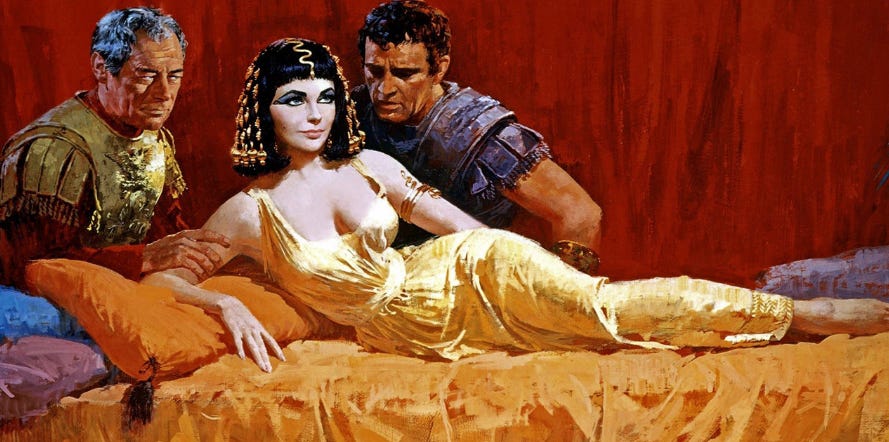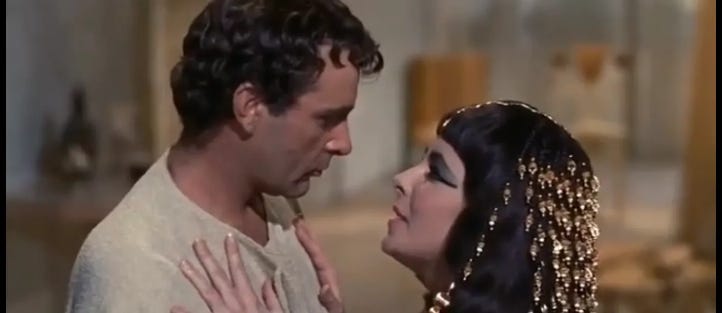Cleopatra (1963)
Cleopatra, Caesar, Antony, asp.
Cleopatra in one word? Monumental. Its original cut was six hours. It was the most expensive movie ever made. Stars Elizabeth Taylor and Richard Burton began an infamous affair during production. The film even helped destroy the studio system and forever changed the way movies were made. But watch Cleopatra’s entrance into Rome and tell me it wasn’t all worth it.
Though Cleopatra is primarily remembered for Burton and Taylor’s on-screen and off-screen romance, it was Rex Harrison who received an Oscar nomination for his role as Julius Caesar. But because Cleopatra, Caesar, and Mark Antony are historical figures whose exploits you should know, today we’re jumping right into the Trivia section, which doubles as a plot summary for the film.
The Trivia, Part I: Caesar and Cleopatra
Because contemporary histories of Cleopatra were primarily written by Romans, she’s often only defined by her relationships with Romans.1 That’s why Cleopatra opens not with her, but with Julius Caesar’s civil war against Pompey. After Pompey’s loss at the Battle of Pharsalus, he flees to Egypt with Caesar in hot pursuit. Arriving in the great city of Alexandria, Caesar finds unrelated castle drama: the sibling rulers, Ptolemy XIII and Cleopatra, are at war, with Ptolemy having driven Cleopatra out of the city. To curry favor with Caesar, Ptolemy has also killed Pompey, presenting Caesar with his severed head.
The Pompey business complete, Caesar dives into Egyptian politics. A stable, loyal Egypt is needed because it can provide wheat, gold, and slaves to Rome.2 Caesar wants to uphold the status quo (Cleopatra and Ptolemy ruling together), but Cleopatra knows this is untenable. To plead her case to Caesar, the exiled queen sneaks into her own palace rolled up in a carpet.
Ptolemy’s forces, who worry Caesar will turn Egypt into a province of Rome, besiege the palace. Caesar’s legions defeat the enemy army and kill Ptolemy. But who cares about the war—Caesar and Cleopatra are sleeping together!
Caesar names Cleopatra queen of Egypt3, marries her4, and sires the child Caesarion5 by her. Cleopatra encourages Caesar to take up the mantle of Alexander the Great, in whose shadow he lives, and go rule the whole freakin’ world. To begin, Caesar goes back to Rome and demands the Senate name him emperor. They’re not really feeling it. Brutus, save us!6
So Caesar’s dead and we’re only halfway through the film. Now, an intermission.
Intermission: More Elizabeth Taylor Marriages
In our post on Cat on a Hot Tin Roof, we discussed the third of Taylor’s husbands, Mike Todd. Well, Todd died in a plane crash in 1958 and a despondent Taylor began an affair with singer Eddie Fisher. Unfortunately, Fisher was already married to America’s sweetheart, Debbie Reynolds7, and the scandal brought in heaps of bad press. Fisher divorced Reynolds and became Taylor’s #4 in 1959, but the tawdry business effectively ended Fisher’s career.
Soon after, on the set of Cleopatra, Taylor began a new affair with the man who’d become husband #5 (and then, later, #7): Richard Burton. It would be hard to overstate how famous Taylor and Burton were and how big a story their affair was. Besides the headlines and paparazzi photos, their relationship played out in movie theaters, as they made eleven films together (including another we’ll soon watch). Stay tuned—there’s still lots more to Liz’s love life.
Trivia, Part II: Antony and Cleopatra
Because power in Rome isn’t hereditary, Caesar’s death leads to a power struggle. Some of those vying for power:
Conspirators Cassius and Brutus, leading a faction called the Liberators.
Octavian, Caesar’s great-nephew, who was named Caesar’s heir.
Sextus Pompey, son of that guy who was decapitated in Egypt at the beginning of the movie.
Two of Caesar’s generals, Mark Antony and Lepidus.
Octavian, Mark Antony, and Lepidus put aside their (significant) differences and form the second triumvirate to fight against Cassius and Brutus. At the Battle of Philippi, they win; now they can sit back, happy that the Roman Republic will continue for the next 2,000 years another civil war, this one between Mark Antony and Octavian, hasn’t yet started.
Pursuing further war against Rome’s enemies, Mark Antony wants to fight the Parthians in the east. To do so, he’ll need the wealth of Egypt backing him. That leads the protégé of Caesar to Cleopatra’s court—and then, into Caesar’s ex’s bed.
Antony is in love with Cleopatra. Cleopatra is in love with the idea that Antony could vanquish Octavian and give Caesarion a clearer path to power. But when Antony returns to Rome, he agrees to a new treaty with his fellow triumvirs and seals it with a marriage, wedding Octavian’s sister Octavia. (Cleopatra does not take this well.) Still, Cleopatra never leaves Antony’s mind, and when he finally goes off to fight the Parthians, he fires off a “u up?” to Cleo and ghosts Octavia.
Though Antony wins military victories in the east, his actions in Egypt don’t sit well with Rome. The worst is the “Donation of Alexandria,” where Antony promises Roman lands to both Caesarion and the three children he has sired with Cleopatra. Octavian begins a propaganda blitz in Rome against Antony, and when the triumvirate expires, Octavian rallies Rome for another civil war. The showdown is at Actium, in Greece; Agrippa, a general of Octavian’s, lays waste to Antony’s navy while Antony and Cleopatra flee.
After Actium, Octavian comes a-knockin’ in Alexandria. It’s the end of the road for Cleo and Tony so they gotta kill themselves.
Antony’s suicide happens when Cleopatra tricks him into thinking she’s dead by locking herself in her mausoleum. Antony tries to kill himself but doesn’t die immediately; as he’s bleeding out, Cleopatra has him brought to her mausoleum where he dies in her arms.
In literature, Cleopatra is said to commit suicide with an asp (an Egyptian cobra) hidden in a basket of figs. This is probably untrue; the story likely arose because the asp is both venomous and a symbol of Egypt. It’s more likely she just used regular old poison.
With the death of Cleopatra goes the Ptolemaic dynasty.8 Egypt becomes a Roman province and Octavian becomes the first Roman emperor.
Okay, that’s the plot (and a lot of history). But how is the movie? Well, it’s inconsistent. Rex Harrison is perfect as the imperious Caesar but he has no chemistry with Elizabeth Taylor. Burton doesn’t ever show the joy or passion of the real Mark Antony, instead playing him as a “besotted, vain weakling.” You never understand why Cleopatra would want to be with him—or, honestly, why Taylor would want to be with Burton. The best performance comes from Roddy McDowall, whose Octavian steals the show.9
But Elizabeth Taylor is the star. This isn’t her best performance—I’m not sure it’s even good—but it’s the one that captures the glamorous idea of Elizabeth Taylor better than anything else. Of course Liz Taylor made a four hour epic about her sexuality destroying two of history’s most powerful men. Taylor herself was one of history’s most famous maneaters. It’s the perfect role for her. How could they have ever considered Audrey Hepburn for it?
Rating: 6/10, but seriously, how do you even rate Cleopatra? It’s like rating a hurricane. How about this: it’s a 5 on the Saffir-Simpson scale.
In author Stacy Schiff’s “Cleopatra,” Schiff writes that Cleopatra “effectively ceases to exist without a Roman in the room.”
Cleopatra puts it thusly: “Shall we agree upon what Rome […] has always wanted of Egypt? Corn, grain, treasure. It’s the old story. Roman greatness built upon Egyptian riches.”
Though her other brother, Ptolemy XIV, was installed as co-ruler. Unlike XIII, XIV kept out of Cleopatra’s way (though she eventually offed him anyway).
Despite Caesar already having a wife, Calpurnia. Don’t worry: Caesar and Cleopatra were married in a “barbarian Egyptian ceremony,” which wasn’t recognized by Rome.
Caesarion is a nickname, meaning “little Caesar” (pizza pizza); his actual name was Ptolemy XV Caesar.
This isn’t director Joseph L. Mankiewicz’s first rodeo with the assassination of Julius Caesar. We covered his first time here.
Eddie Fisher is today remembered best as Taylor’s husband (and, with Reynolds, Carrie Fisher’s father), but he was a famous singer and TV actor in his own right. He also starred with Taylor in 1960’s BUtterfield 8.
A note on Cleopatra’s kids: Caesarion, who Cleopatra sends into hiding, returns to Alexandria to bargain with Octavian. He’s put to death, since his parentage makes him a threat. The other three kids are marched through the streets of Rome during Octavian’s triumph.
In 1972, McDowall went from playing Octavian to playing Caesar—or, rather, playing chimp Caesar—in Conquest of the Planet of the Apes.







